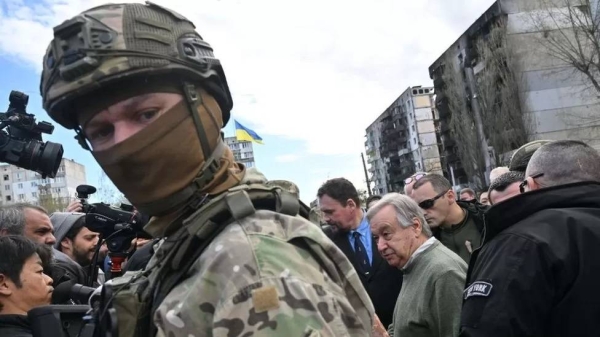
Until earlier this week, Shanahan had never visited Afghanistan or Iraq, where the US still has about 19,000 troops
Shanahan, who served as Mattis’ deputy, is not as well known in foreign policy circles
BRUSSELS: US allies will use the opportunity of Patrick Shanahan’s first NATO ministers meeting this week to see whether the acting defense secretary will be as supportive of the military alliance as his predecessor was, defense officials and experts said.
Shanahan, a former Boeing Co. executive who has mostly focused on internal issues since he joined the Pentagon in July 2017, took over on Jan. 1 from former secretary Jim Mattis, who quit over policy differences with US President Donald Trump.
In his resignation letter, Mattis laid bare what he saw as an irreparable divide between himself and Trump, and implicitly criticized the president for failing to value allies who have fought alongside the United States in several wars. Mattis mentioned NATO twice.
Shanahan, who served as Mattis’ deputy, is not as well known in foreign policy circles, and allies are keen to see whether he will push back on rhetoric by Trump that has questioned the need for NATO.
Until earlier this week, Shanahan had never visited Afghanistan or Iraq, where the United States still has about 19,000 troops.
A European NATO diplomat, speaking on condition of anonymity, said the hope was that Shanahan would be someone they could trust and work with.
“Mattis was one of the few remaining senior Trump administration officials we could rely on, so there’s a great sense of loss,” the diplomat said.
“Frankly, Shanahan is an unknown to us.”
While Trump has said Shanahan is doing a good job, there is no certainty that he will be formally nominated for the position, which Trump shuffled Mattis out of just 11 days after he resigned.
Shanahan has been serving in an acting capacity since the start of the year. The longest-serving acting defense secretary, William Taft, did the job for 60 days.
In a sign of just how precarious his situation is, the chairman of the Senate Armed Services Committee said on Tuesday he did not think Trump would nominate Shanahan.
Asked about Senator James Inhofe’s comments, Shanahan told reporters in Brussels: “Whether there is acting next to your name or not, it’s the same job, I’ll do the job the same way. It’s a pleasure to serve in this role.”
Derek Chollet, a former Pentagon official now at the German Marshall Fund think tank, said it was not fair to expect Shanahan to be able to calm nervous allies by himself, especially in an acting capacity.
A senior US defense official, speaking on the condition of anonymity, said Shanahan would back NATO during his talks in Brussels.
“The overarching message is one of bringing reassurance and confidence to our alliance, that America remains deeply committed to the alliance,” the official said.
But the official added that Shanahan would push allies on the need for burden sharing and meeting their international commitments, a key demand of Trump’s.
Allies are likely to seek reassurances on a number of key policy areas, including on the future of NATO in Syria and Afghanistan, and plans to withdraw from the 1987 Intermediate-Range Nuclear Forces (INF) Treaty with Russia.
In December, Trump confounded his own national security team and international allies with a surprise decision to withdraw 2,000 US troops from Syria. Shanahan will meet a small group of defense ministers in Munich to go over those plans.
On Afghanistan, US officials have held several rounds of talks with the Taliban in Qatar in what is widely seen as the most serious bid yet for peace in Afghanistan, which has been at war since the United States ousted the country’s former leaders after the Sept. 11, 2001, attacks.
However, the talks have created uncertainty within Europe about what it means for the NATO mission in the country, and individual countries are reconsidering their troop presence.
The senior US defense official said Shanahan would also talk to allies about arms control, after the United States earlier this month announced it would withdraw from the INF treaty in six months unless Moscow ends its alleged violations of the landmark pact.
The official said the NATO summit would be an opportunity to discuss any potential new arms control architecture and what is needed to protect the NATO alliance.












